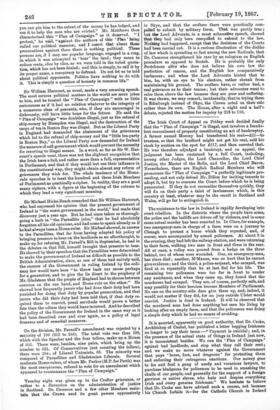Sir William Hareourt, as usual, made a very amusing speech.
The most serious political matters in the world are mere jokes to him, and he treated the "Plan of Campaign" with as little seriousness as if it had no relation whatever to the integrity of a numerous class of peasants, who, if they are encouraged in dishonesty, will have little hope for the future. He said the "Plan of Campaign" was doubtless illegal, just as the refusal of ship-money by Hampden was illegal, and the destruction of the cargo of tea in Boston Bay was illegal. But as the Liberal Party in England had demanded the abatement of the grievances which led to the refusal of ship-money and the "little tea-party in Boston Bay," so the Liberal Party now demanded for Ireland the measure of self-government which would prevent the necessity for resorting to illegal means. In a word, so far as Sir W. Ear- court's speech went, there was not the slightest recognition that the Irish have a full, and rather more than a full, representation in Parliament, and that if they would but use their influence in the constitutional way, they might obtain almost any reform of grievances they wish for. The whole tendency of the Home. rule speeches is to treat the hundred and three Irish Members of Parliament as practically a cipher. In reality, they are a good many ciphers, with a figure at the beginning of the column to which they lend a very significant meaning.


































 Previous page
Previous page